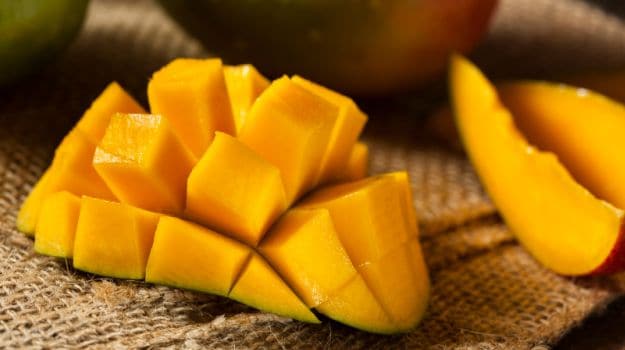Mangoes are in peak season now and are selling for a song at most places in where I am living. The kids are the happiest now as the refrigerator is always well stocked with sweet mangoes. They help themselves to the mangoes anytime they wish. Sherilyn loves whizzing up smoothies from mangoes mixed with a variety of other fruits and frozen bananas.

Belonging to the flowering plant family Anacardiaceae and going by the scientific name Mangifera indica L., mangoes are filled with vitamins, minerals, fiber and antioxidants.
One cup of diced mango contains the following:
100 calories
28 grams of carbohydrates
3 grams of fiber
0.8 grams of protein
46 milligrams of vitamin C (76 percent daily value (DV))
1262 IU of vitamin A (35 percent DV)
23.1 micrograms of folate (20 percent DV)
0.2 milligrams of vitamin B6 ( 11 percent DV)
1.8 milligrams of vitamin E (9 percent DV)
0.2 milligrams of copper (9 percent DV)
6.9 micrograms of vitamin K (8 percent DV)
257 milligrams of potassium (7 percent DV)
Mangoes also provide calcium; iron; magnesium; and powerful antioxidants such as zeaxanthin, quercetin, astragalin and beta-carotene.
Mangoes can possibly help protect and strengthen the body in the following ways:
Age-related macular degeneration
The antioxidant zeaxanthin, found in mangoes, filters out harmful blue light rays and is thought to play a protective role in eye health and possibly ward off damage from macular degeneration.
A higher intake of all fruits (three or more servings per day) has also been shown to decrease the risk of and progression of age-related macular degeneration.
Asthma prevention
The risk of developing asthma is lower in people who consume a high amount of certain nutrients. One of these nutrients is beta-carotene, found in mangoes, papaya, apricots, broccoli, cantaloupe, pumpkin, and carrots.
Cancer
Diets rich in beta-carotene may also play a protective role against prostate cancer, according to a study conducted by the Harvard School of Public Health’s Department of Nutrition and has been shown to reduce the risk of colon cancer in a Japanese study.
In a study conducted by Texas AgriLife Research, food scientists tested mango polyphenol extracts on colon, breast, lung, leukemia, and prostate cancer tissue; mangoes were shown to have some impact on all cancers tested but were most effective with breast and colon cancers.
The researchers are planning to do a follow-up study; they will focus on individuals with increased inflammation in their intestines and therefore a higher risk for cancer.
Bone health
Low intakes of vitamin K are associated with a higher risk of bone fracture. Adequate vitamin K consumption can be achieved by eating a proper intake of fruits and vegetables. Vitamin K is important for improving calcium absorption, essential for optimal bone health.
Diabetes
Studies have shown that people with type 1 diabetes who consume high-fiber diets have lower blood glucose levels; and individuals with type 2 diabetes may have improved blood sugar, lipids, and insulin levels. One cup of mango provides about 3 grams of fiber.
Digestion
Mangoes, because of their fiber and water content, help to prevent constipation and promote regularity and a healthy digestive tract.
Heart disease
The fiber, potassium, and vitamin content in mangoes all help to ward off heart disease. An increase in potassium intake along with a decrease in sodium intake is the most important dietary change that a person can make to reduce their risk of hypertension.
Skin and Hair
Mangoes are also great for your hair because they contain vitamin A, a nutrient required for sebum production that keeps hair moisturized. Vitamin A is also necessary for the growth of all bodily tissues, including skin and hair.
Adequate intake of vitamin C, found in just 1 cup of mango per day, is needed for the building and maintenance of collagen, which provides structure to skin and hair.
Boosts Brain Health
Considered one of the great brain foods, mangoes are packed with vitamin B6, which is essential for maintaining, if not improving, brain function. Vitamin B6 and other B vitamins are crucial for maintaining healthy brain neurotransmitters and also help in supporting a healthy mood as well as healthy sleep patterns.
Naturally Treats Anemia
Mangoes are also rich in iron and may be part of the answer for the millions of people worldwide who are iron deficient. In fact, an iron deficiency can lead to becoming anemic, since iron deficiency is the most common feature of anemia. If this describes you or a loved one, consider eating more mangoes and other iron-packed foods. A year ago I was severely anemic and I think I am still slightly anemic, thus I am definitely going to indulge in more mangoes while they are in peak season now!
Relieves Constipation
An average-sized mango can have up to 40 percent of your daily requirement for fiber, and fiber offers many health benefits, including acting as a natural remedy for constipation.

Diabetics and Mangoes
There’s a lingering myth among diabetics, especially new diabetics, that you just can’t indulge in sweet foods and fruits. It isn’t a bad rule when it comes to cakes and cookies, but it certainly doesn’t apply to healthful fresh fruits such as mangoes. A reasonable portion of mango has little effect on your blood sugar and is good for you in many other ways, so feel free to enjoy them in moderation.
According to diabetes.co.uk, mangoes are good for diabetes and pre diabetes. Eating a mango every day could protect people against high cholesterol as well as diabetes.
Similarly, Dr. Sujeet Jha, an eminent Endocrinologist in India has recently decoded Diabetic Diet Myths.
More reading and researches on how mangoes can help prevent and treat pre-diabetes and diabetes can be found here.
Disclaimer: This content including advice provides generic information only. It is in no way a substitute for qualified medical opinion. Always consult a specialist or your own doctor for more information.
